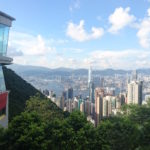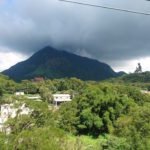Halfway through our internship in China and it feels like we have been here both an eternity and barely a moment. Although we just recently had a group trip to Emeishan, three of us still needed to leave the country for visa purposes. Thus: three day vacation in Hong Kong! Of course travel added some time, but all told Lorelei, Kat, and I spent two nights and three days in the ‘Pearl of the Orient’ while Michelle held down the fort back in Ya’an. Although the city itself is as built-up, modern, and full of cultural fusion as you have heard, what surprised me the most was the amount of accessible greenspace. There were plenty of parks in the city itself, but also some of the 250 islands that make up the Hong Kong Special Administrative Region were fairly undeveloped with miles of hiking trails and scenic beaches. Some photos from the Ten Thousand Buddha temple, Tian Tan Giant Buddha, and Victoria Peak below.
Another interesting part of being in Hong Kong was a chance to hear a different Chinese! Here in Sichuan, people speak a regional variety of standard Mandarin; however, in Hong Kong they speak Cantonese, from the Guangzhou province in southern China. Although they use the same written language, the spoken forms are about as close as Italian and Portuguese. Luckily – since none of us speak any Cantonese – Hong Kong is essentially a trilingual city with nearly everyone speaking Cantonese, English, and Mandarin. Needless to say, we got around without any issues.
Back in Ya’an, I get to practice my little baby Mandarin plenty! Whether it’s asking for meatless dishes at a restaurant or asking for permission to give a fruitcicle to a panda, my one year of Chinese back in college has definitely come in handy! Unfortunately, that was ten years ago, but I did take an evening refresher course in Scotland. So here are some useful phrases I use on a daily basis:
- I don’t eat meat. = Wo bu chi rou. 我不吃肉。
- Can I have___without meat? = Wo yao ___ bu fang rou, keyi ma? 我要 ___ 不放肉,可以吗?
- Could you add some vegetables to this? = Duo fang cai, keyi ma? / Keyi Jia cai ma? 多放菜,可以吗? / 可以加菜吗?
- Do you have pickled cabbage? = You pao cai ma? 有泡菜吗?
- Two iced beers, please. = Lai liang ping bing pijiu. 来两瓶啤酒。
- Can I observe ___? = Wo keyi guancha ___ ma? 我可以观察 吗?
- Can I give the red ball to ___? Wo ba lanqiu gei ___ wan, keyi ma? 我把篮球给___玩, 可以吗?
- Can you wait a moment? I just have five minutes left. = Keyi deng yi xia ma? Wo hai you wu fenzhong. 可以等一下吗? 我还有五分钟。
- Is this panda pregnant or sick? = Qing wen, zhe ge xiongmao huaitai le haishi bu shufu? 请问,这个熊猫怀胎了还是不舒服?
- He is still eating bamboo. = Ta hai zai chi zhuzi. 他还在吃竹子。
I cannot guarantee that any of these are grammatically or semantically accurate, but I am definitely understood! That’s the important part of language, after all: getting the point across and hopefully not offending anyone along the way. We can aspire to more, but when one is struggling in a new tongue, it pays to have measurable goals.
______________________________________________________________________________________________________
 I hope everyone enjoyed! Feel free to try out your fun, new, Chinese panda phrases in daily life. As we are quickly approaching August, this means that our time in China is quickly coming to an end. If you have any questions, please leave them in the comments below.
I hope everyone enjoyed! Feel free to try out your fun, new, Chinese panda phrases in daily life. As we are quickly approaching August, this means that our time in China is quickly coming to an end. If you have any questions, please leave them in the comments below.





Thank you for the Chinese lesson! The owner of the Chinese restaurant I frequent likes to hear me “try” to speak Chinese! Best of luck in your future!
Your great adventure continues! How do you say “That’s a really cute cub! Can he/she come home with me?” I have a feeling I’ll be saying that a lot when I get to China in September.